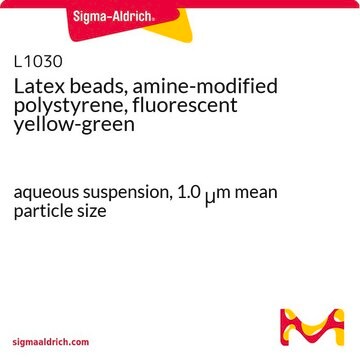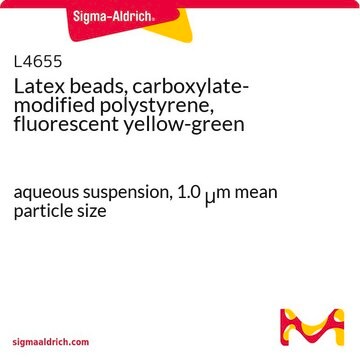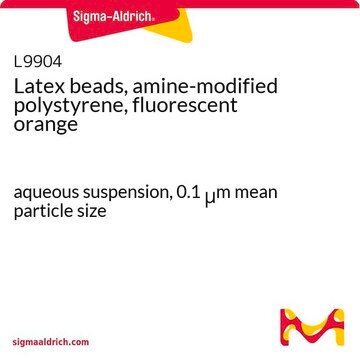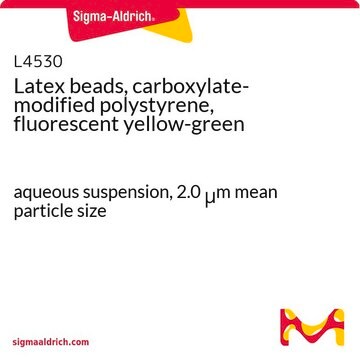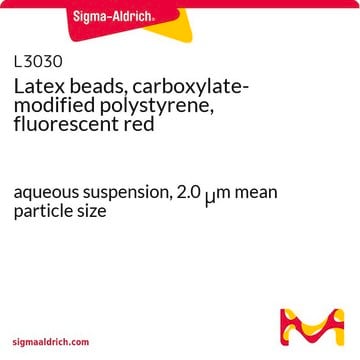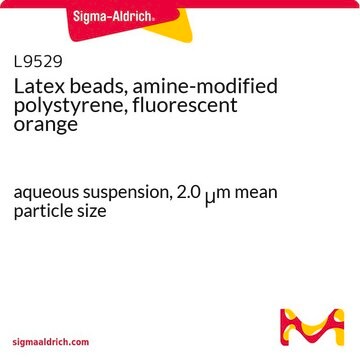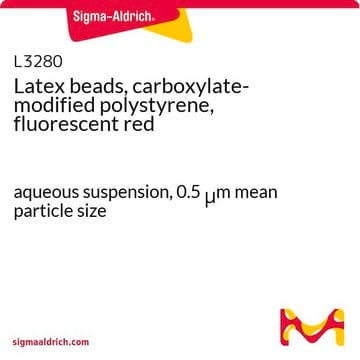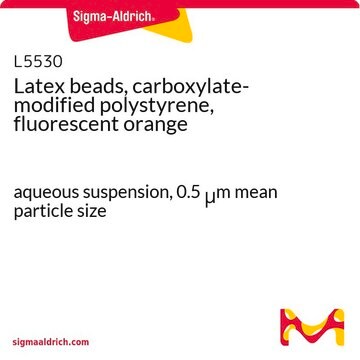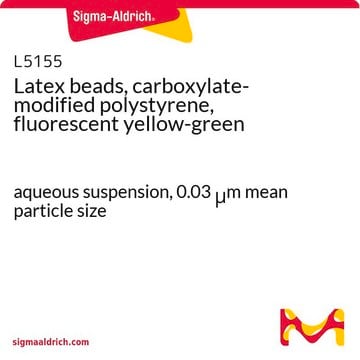L2778
Latex beads, amine-modified polystyrene, fluorescent red
aqueous suspension, 1.0 μm mean particle size
Synonym(s):
Fluorescent latex beads
Sign Into View Organizational & Contract Pricing
All Photos(1)
About This Item
Recommended Products
form
aqueous suspension
composition
Solids, 2.5%
technique(s)
cell based assay: suitable
mean particle size
1.0 μm
fluorescence
λex ~575 nm; λem ~610 nm
application(s)
cell analysis
Looking for similar products? Visit Product Comparison Guide
Application
Latex beads, amine-modified polystyrene, fluorescent red has been used:
- to study the effect of Ganoderma lucidum polysaccharides (GLP) on microglia phagocytic behavior
- to study cell phagocytosis in human leukemia cell lines
- in macrophage phagocytosis assay
- to induce detectable engulfment by microglia in Ganoderma lucidum
Biochem/physiol Actions
Amine-modified polystyrene latex beads have been used to develop an electrochemical nitrite nanosensor as well as to validate a pharyngeal aspiration technique for exposing the mouse lung to respirable particles.
Storage Class Code
10 - Combustible liquids
WGK
WGK 3
Flash Point(F)
Not applicable
Flash Point(C)
Not applicable
Certificates of Analysis (COA)
Search for Certificates of Analysis (COA) by entering the products Lot/Batch Number. Lot and Batch Numbers can be found on a product’s label following the words ‘Lot’ or ‘Batch’.
Already Own This Product?
Find documentation for the products that you have recently purchased in the Document Library.
Customers Also Viewed
Qing Cai et al.
Journal of neuroinflammation, 14(1), 63-63 (2017-03-28)
Ganoderma lucidum (GL) has been widely used in Asian countries for hundreds of years to promote health and longevity. The pharmacological functions of which had been classified, including the activation of innate immune responses, suppression of tumour and modulation of
Kiat T Tan et al.
Platelets, 16(6), 368-371 (2005-10-01)
Platelet microparticles (PMPs), procoagulant membrane vesicles derived from activated platelets, are elevated in acute myocardial infarction and unstable angina but their relationship to inflammation and indices of coronary artery disease are unclear. We therefore hypothesised that PMPs are related to
Lisa D Brown et al.
Parasites & vectors, 9, 237-237 (2016-04-28)
Vector-borne pathogens must overcome arthropod infection and escape barriers (e.g. midgut and salivary glands) during the extrinsic incubation period (EIP) before subsequent transmission to another host. This particular timespan is undetermined for the etiological agent of flea-borne spotted fever (Rickettsia
Ya Xu et al.
Oncology reports, 37(5), 2711-2719 (2017-04-26)
Microvesicle biogenesis is a highly regulated process. Aberrant release of microvesicles from cancer cells have been associated with their invasiveness and prognosis. However, the mechanism of aberrant release remains poorly understood. Herein, we found that hepatocellular carcinoma cells shed more
Maneerat Ekkapongpisit et al.
International journal of nanomedicine, 7, 4147-4158 (2012-08-21)
Nanoparticles engineered to carry both a chemotherapeutic drug and a sensitive imaging probe are valid tools for early detection of cancer cells and to monitor the cytotoxic effects of anticancer treatment simultaneously. Here we report on the effect of size
Our team of scientists has experience in all areas of research including Life Science, Material Science, Chemical Synthesis, Chromatography, Analytical and many others.
Contact Technical Service